外研版七下语法填空讲课讲稿
- 格式:doc
- 大小:28.00 KB
- 文档页数:3
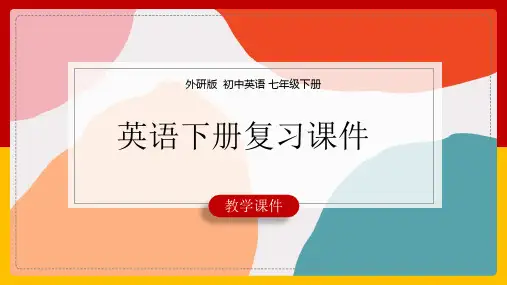
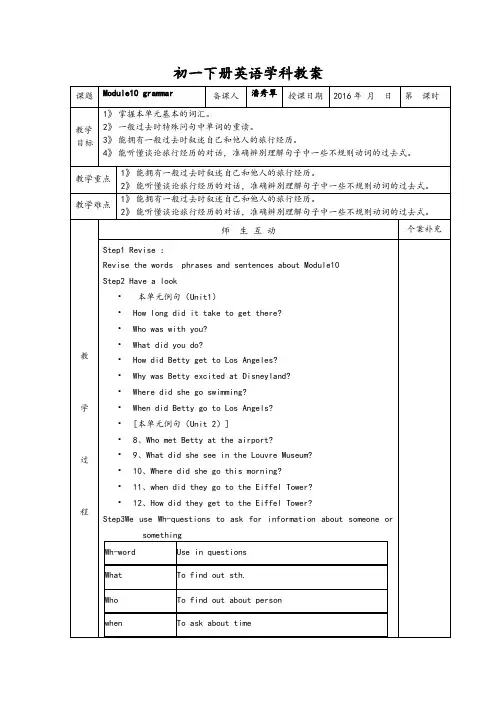
初一下册英语学科教案课题Module10 grammar 备课人潘秀翠授课日期2016年月日第课时教学目标1》掌握本单元基本的词汇。
2》一般过去时特殊问句中单词的重读。
3》能拥有一般过去时叙述自己和他人的旅行经历。
4》能听懂谈论旅行经历的对话,准确辨别理解句子中一些不规则动词的过去式。
教学重点1》能拥有一般过去时叙述自己和他人的旅行经历。
2》能听懂谈论旅行经历的对话,准确辨别理解句子中一些不规则动词的过去式。
教学难点1》能拥有一般过去时叙述自己和他人的旅行经历。
2》能听懂谈论旅行经历的对话,准确辨别理解句子中一些不规则动词的过去式。
教学过程师生互动个案补充Step1 Revise :Revise the words phrases and sentences about Module10Step2 Have a look•本单元例句(Unit1)•How long did it take to get there?•Who was with you?•What did you do?•How did Betty get to Los Angeles?•Why was Betty excited at Disneyland?•Where did she go swimming?•When did Betty go to Los Angels?•[本单元例句(Unit 2)]•8、Who met Betty at the airport?•9、What did she see in the Louvre Museum?•10、Where did she go this morning?•11、when did they go to the Eiffel Tower?•12、How did they get to the Eiffel Tower?Step3We use Wh-questions to ask for information about someone or somethingWh-word Use in questionsWhat To find out sth.Who To find out about personwhen To ask about timeWhere To ask about placewhy To ask about the reasonHow long To talk about the degreeWhat –Activity or thing(对行为和事物提问)•-What were you talking about then?•你们那时在谈什么?•We were talking about our family.•我们在谈论我们的家庭情况。

外研版七年级下册英语课堂讲解全文共四篇示例,供读者参考第一篇示例:外研版七年级下册英语课堂讲解在外研版七年级下册的英语课堂上,学生将接触更加丰富和深入的英语知识,包括语法、词汇等方面的学习。
本文将针对外研版七年级下册英语课堂讲解的内容进行详细介绍,帮助学生更好地掌握和理解课程内容。
一、语法学习外研版七年级下册英语课堂将继续强调语法知识的学习,包括一般现在时、一般过去时、现在进行时、将来时等。
在课堂上,老师会通过丰富的例句和练习来帮助学生理解和掌握这些语法知识。
学生需要多加练习,通过不断地练习,才能真正掌握这些语法知识。
1. 一般现在时一般现在时用来表示经常性或习惯性的动作,以及客观事实。
例如:- I get up at six every morning.- She likes watching TV in the evening.在课堂上,老师会通过练习让学生掌握一般现在时的用法和构成规则,帮助他们能够正确地运用这一时态。
2. 一般过去时一般过去时用来表示过去发生的动作或状态。
例如:- We went to the park yesterday.- She played basketball last week.在课堂上,老师会通过举例和练习让学生理解一般过去时的用法,帮助他们掌握这一时态。
3. 现在进行时现在进行时用来表示现阶段正在进行的动作。
例如:- They are playing football now.- She is reading a book at the moment.在课堂上,老师会通过口头练习和书面练习让学生熟悉现在进行时的用法,帮助他们能够正确地运用这一时态。
4. 将来时将来时用来表示将来发生的动作或状态。
例如:- I will go to Beijing next week.- She is going to have a party tomorrow.在课堂上,老师会通过例句和练习来帮助学生掌握将来时的用法,让他们能够准确地运用这一时态。

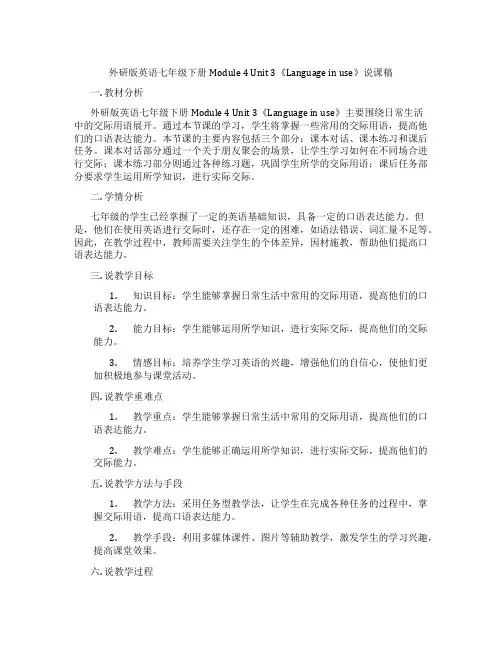
外研版英语七年级下册Module 4 Unit 3《Language in use》说课稿一. 教材分析外研版英语七年级下册Module 4 Unit 3《Language in use》主要围绕日常生活中的交际用语展开。
通过本节课的学习,学生将掌握一些常用的交际用语,提高他们的口语表达能力。
本节课的主要内容包括三个部分:课本对话、课本练习和课后任务。
课本对话部分通过一个关于朋友聚会的场景,让学生学习如何在不同场合进行交际;课本练习部分则通过各种练习题,巩固学生所学的交际用语;课后任务部分要求学生运用所学知识,进行实际交际。
二. 学情分析七年级的学生已经掌握了一定的英语基础知识,具备一定的口语表达能力。
但是,他们在使用英语进行交际时,还存在一定的困难,如语法错误、词汇量不足等。
因此,在教学过程中,教师需要关注学生的个体差异,因材施教,帮助他们提高口语表达能力。
三. 说教学目标1.知识目标:学生能够掌握日常生活中常用的交际用语,提高他们的口语表达能力。
2.能力目标:学生能够运用所学知识,进行实际交际,提高他们的交际能力。
3.情感目标:培养学生学习英语的兴趣,增强他们的自信心,使他们更加积极地参与课堂活动。
四. 说教学重难点1.教学重点:学生能够掌握日常生活中常用的交际用语,提高他们的口语表达能力。
2.教学难点:学生能够正确运用所学知识,进行实际交际,提高他们的交际能力。
五. 说教学方法与手段1.教学方法:采用任务型教学法,让学生在完成各种任务的过程中,掌握交际用语,提高口语表达能力。
2.教学手段:利用多媒体课件、图片等辅助教学,激发学生的学习兴趣,提高课堂效果。
六. 说教学过程1.导入:通过一个简单的日常交际场景,引导学生进入学习状态,激发他们的学习兴趣。
2.新课呈现:通过展示课本对话,让学生初步感知日常生活中常用的交际用语。
3.课堂练习:通过各种练习题,让学生巩固所学知识,提高他们的口语表达能力。

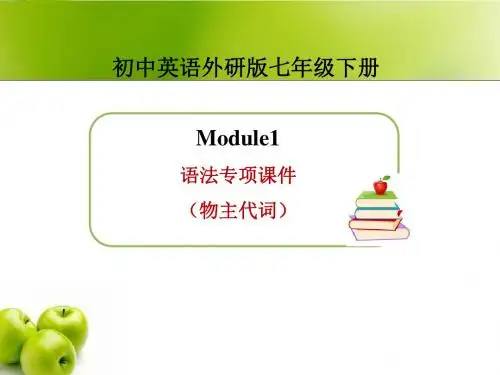
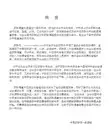
初中英语(外研社版) 七年级下语法复习讲义( Module 3-4) 1. 生词Plan revise test wife why foreign shopping early out on want cross useLife will paper ruler farm rain weather wind strong comfortable heat light free2. 重点句子,考点出处Module 31. We are going to listen to some music.2. Would you like to come?3. What’s Betty going to do on Saturday afternoon?4. I’m going to visit them in China because it’s my granddaughter’s birthday.5. I’m going to learn English because I want to make some American friends.6. They’re going to cross the Pacific Ocean and the Atlantic Ocean.Module 41. Everyone will study at home in the future.2. Everyone will send their homework to the teacher by email.3. And will they send their home work to the teacher by email?4. I’m not sure.5. Planes will be very large so flying will be very cheap.6. It will get warm at the North pole so the seas will be very rough.7. People will do many things on the Internet.8. Remember! You won’t understand every word.9. Try to understand the main idea with the words you know.10. Machines will do work in factories.11. Robots will clean the house, cook food, care the children and help old people.。
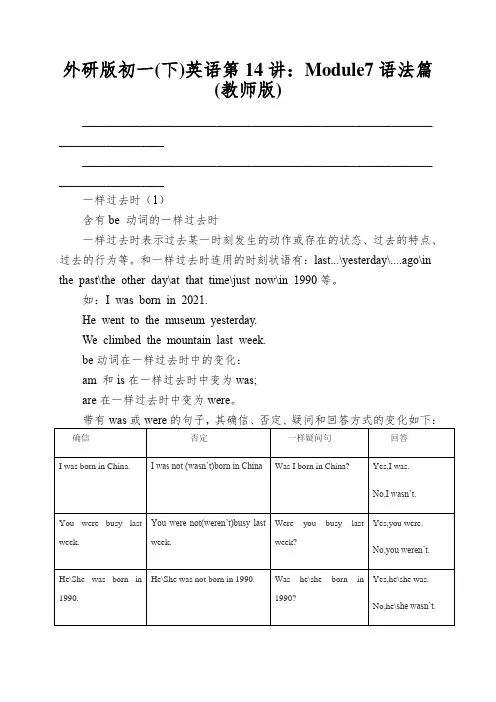
外研版初一(下)英语第14讲:Module7语法篇(教师版)____________________________________________________________ ______________________________________________________________________________ __________________一样过去时(1)含有be 动词的一样过去时一样过去时表示过去某一时刻发生的动作或存在的状态、过去的特点、过去的行为等。
和一样过去时连用的时刻状语有:last...\yesterday\....ago\in the past\the other day\at that time\just now\in 1990等。
如:I was born in 2021.He went to the museum yesterday.We climbed the mountain last week.be动词在一样过去时中的变化:am 和is在一样过去时中变为was;are在一样过去时中变为were。
带有was或were的句子,其确信、否定、疑问和回答方式的变化如下:单项选择He__________born here ten years ago.A.wasB.wereC.isD.are答案:A解析:考查一样过去时be动词的用法,主语是he时be动词用was故答案是A。
2.__________the president born in a small village?A.IsB.WasC.AreD.Were答案:A解析:考查一样过去时be动词一样疑问句的用法,主语是the preside nt谓语动词用单数was,故选A。
3.There__________a lot of trees in these mountains ten years ago.A.isB.wasC.areD.were答案:D解析:依照句意“10年前在这些山上有许多树,用一样过去时,主语是a lot of trees谓语动词用复数were”故选D。
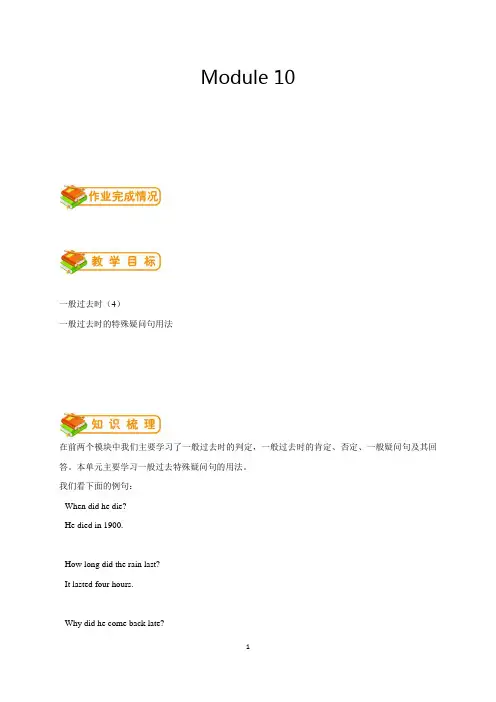
Module 10____________________________________________________________________________________________________________________________________________________________一般过去时(4)一般过去时的特殊疑问句用法在前两个模块中我们主要学习了一般过去时的判定,一般过去时的肯定、否定、一般疑问句及其回答。
本单元主要学习一般过去特殊疑问句的用法。
我们看下面的例句:--When did he die?--He died in 1900.--How long did the rain last?--It lasted four hours.--Why did he come back late?--Because he wanted to finished the work.综上,我们发现一般过去时的特殊疑问句的用法与一般现在时的特殊疑问句在结构上没有太大的差异,只是使用的助动词不同而已。
单项选择1.--__________did you go there?--Two years ago.A.WhenB.WhereC.WhyD.How答案:A解析:考查一般过去时特殊疑问句的用法,根据回答“两年前”故答案是A。
2.--__________did it take to get there?--About nine hours.A.How farB.How oftenC.How longD.How many答案:C解析:考查一般过去时特殊疑问句的用法,根据回答“9个小时”是时间段故选C。
3.--__________did you buy?--Two bags.A.WhenB.WhereC.WhyD.What答案:D解析:根据句子回答可知是买了什么,故选D。
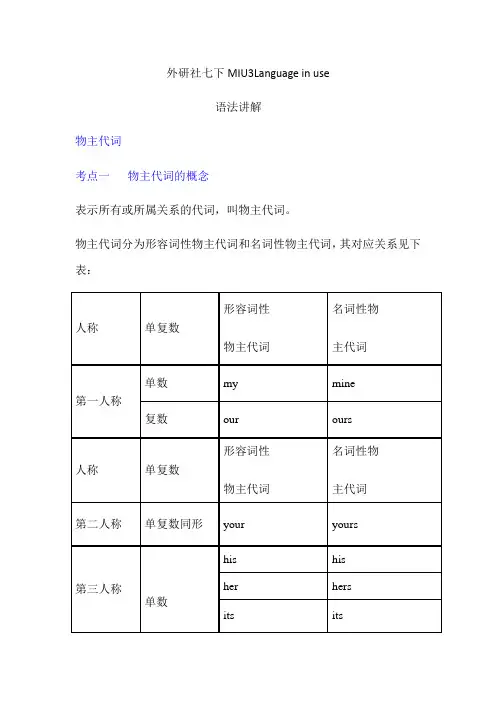
外研社七下MIU3Language in use语法讲解物主代词考点一物主代词的概念表示所有或所属关系的代词,叫物主代词。
物主代词分为形容词性物主代词和名词性物主代词,其对应关系见下表:考点二物主代词的用法考向一形容词性物主代词在句中只用作定语,修饰名词,必须置于名词前,不能单独使用。
如果名词前还有其他的定语,物主代词要放在其他定语之前。
eg:This is his white shirt.这是他的白衬衫。
例题My brother likes painting(绘画). It's one of ________hobbies. A.my B.her C.his D.your考向二名词性物主代词=形容词性物主代词+名词,在句中作主语、宾语、表语。
注意:在使用名词性物主代词时,必须有特定的语言环境,只有上文提及了某个名词,才能知道名词性物主代词指代的事物。
eg: There is a book on the desk. It's hers.桌子上有一本书。
是她的(书)。
(hers=her book)例题—Whose iPad is this?—I think it's________.She was looking for it everywhere.A.she’s B.herC.she D.hers考向三【易错点】名词前若有形容词性物主代词,不可再用a, an, the, this, that, these之类的限定词修饰。
如果要表示这种意义,则用“of +名词性物主代词”这种结构。
eg: a friend of mine我的一个朋友记忆:区分两种物主代词有“名”则“形”,无“名”则“名”。
意思是:后面有名词的话,前面就要用形容词性物主代词。
后面没有名词的话,就用名词性物主代词。
语法小练习1. I don't like________watch. I like________.A.me; your B.my; yourC.me; yours D.my; yours2.These coats are________,and where are________?A.their;our B.their;oursC.theirs;our D.theirs;ours3.—Oh, The Old Man And The Sea! Whose book is it?—It's________.A.I B.meC.my D.mine4. —Excuse me, is this________mobile phone?—No, it isn't. ________is in the office.A.your; My B.your; Mine C.yours; Mine D.yours; My 5.My brother likes painting. It's one of_______ hobbies.A.my B.herC.his D.your知识点一such as 比如,例如eg: He likes many fruits, such as apples, bananas and grapes.他喜欢许多水果,比如苹果、香蕉和葡萄。
Module 10____________________________________________________________________________________________________________________________________________________________一般过去时(4)一般过去时的特殊疑问句用法在前两个模块中我们主要学习了一般过去时的判定,一般过去时的肯定、否定、一般疑问句及其回答。
本单元主要学习一般过去特殊疑问句的用法。
我们看下面的例句:--When did he die?--He died in 1900.--How long did the rain last?--It lasted four hours.--Why did he come back late?--Because he wanted to finished the work.综上,我们发现一般过去时的特殊疑问句的用法与一般现在时的特殊疑问句在结构上没有太大的差异,只是使用的助动词不同而已。
单项选择1.--__________did you go there?--Two years ago.A.WhenB.WhereC.WhyD.How答案:A解析:考查一般过去时特殊疑问句的用法,根据回答“两年前”故答案是A。
2.--__________did it take to get there?--About nine hours.A.How farB.How oftenC.How longD.How many 答案:C解析:考查一般过去时特殊疑问句的用法,根据回答“9个小时”是时间段故选C。
3.--__________did you buy?--Two bags.A.WhenB.WhereC.WhyD.What答案:D解析:根据句子回答可知是买了什么,故选D。
初中英语(外研社版) 7年级(下)语法词汇复习讲义Module 1 People and places话题:Talking about people and places(be doing 特问、一般)重点单词:8:00重点句子,考点出处(背诵):1.I’m standing on the Great Wall of China and talking to you.2.We’re enjoying the school trip a lot.3.Please send a card to Grandma!4.We’re standing in front of Madonna’s home and writing this postcard to you.5.We’re looking at the homes of the film stars.6. How are you?7. See you soon.8. Finish like this.练习:1. Let help you. A. I B. me C. my D. mine2. What Tom reading? A. am B. is C. are D. does3. Mary in our school? A. Is, work B. Are, working C. Do, work D. Does, work4. They tennis now. A. play B. are playing C. played D. plays5. there a bank near here? A. Are B. Is C. Am D. Be6. Jack enjoys football after school. A. plays B. to play C. playing D. play7. --Your mother is waiting for you outside the school gate.-- . A. That’s Ok. B. Really? C. It doesn’t matter. D. Sorry8. Please this book to the classroom. A. take B. bring C. carry D. buy9. He often gets up and at 6:00 in the morning.10. It’s very cold; he finds his cap and . A. put on B. put on it C. puts it on D. put it on11. Be quiet! The baby . A. is sleeping B. is sleeping C. sleep D. sleeped12. –What are you doing?-- . A. I’m writing B. I’m a student C. I’m from Nanning D. I’m Tom13. --Does she often go to see her grandparents?-- . A. Yes, she is B. Yes, she does C. Yes, she do D. Yes, she are14. –Is the man running in the street?-- . A. Yes, he is B. Yes, he does C. Yes, he do D. Yes, he are15. The Blacks are their car to go travelling. A. drives B. driving C. to driving D. drived 每天读本章课文三遍,请家长配合检查,谢谢!Module 2 Spring Festival话题:Talking about spring festival(be doing 答问)重点词组句型:1.一些学生正在擦桌子,另一些在擦椅子。
外研版初一(下)英语第4讲:Module2 语法篇(教师版)Module 2 语法篇____________________________________________ ______________________________________________________________________________ __________________________________掌握情态动词can的用法情态动词的特征:(1)有一定的词义但不能单独作谓语,必须和行为动词或系动词连用,构成谓语。
(2)无人称和数的变化(have to例外,其第三人称单数形式为has to)。
如:We must stay here.(3)后接动词原形,即不带to的不定式。
如|:He may lose her way.(4)具有助动词的作用,可用来构成否定句、疑问句及用于简明答语。
如:--Can you sing an English song?--Yes,I can.肯定回Yes,主语+can.答否定回No,主语+can\t.答如:My sister can sing.My sister can’t sing.--Can your sister sing?--Yes ,she can.--No ,she can’t.单项选择:1.--What can you do?--I __________ play tennis.A.canB.mayC.mustD.have to答案:A解析:can 表示能力。
本句译为“你会做什么?我会打网球。
”2.--Can you play the piano?--No,I __________.But I can play__________violin.A.can,theB.can’t,theC.can,\D.can’t,\答案:D解析:以can开头的一般疑问句否定回答用can’t.西方乐器前有the。
语法填空:(一)阅读下面短文,按照句子结构的语法性和上下文连贯的要求,在空格处填入一个适当的词或使用括号中词语的正确形式填空。
(每空不多于3个单词)My name's Helen. My family often eat fruit salads after dinner. Look 1.______ the list. These are the things 2._______ (make) the fruit salads. I need five 3. _____________ (strawberry) , two bananas, one big apple and one pear. I think I can get 4._______ (they) in the market near my home.I also need some cream (奶油).One bottle of the cream is 20 yuan. The apple and the pear are at 5.______ same price. The strawberry is 10 yuan a kilo 6.______ the banana is 8 yuan a kilo. For all of these, I think 50 yuan 7.______ enough.After 8.______ (buy) all of these things, I'm going to wash them first. Second I will cut them into pieces. Then I will put them into a bowl. 9.______ last, I'll put the cream on. I think it is easy for me and I'm sure I can do it 10.______ (good).考点:一般现在时:be(am,is,are);do, does,There be 句型,一般将来时,宾语从句解答:【语篇分析】1.由第一段第二句“My family often eat fruit salads after dinner.”可知,海伦一家吃水果沙拉的时间常常在晚饭后。
2.由第一段第五句“I need five strawberries, two bananas, one big apple and one pear”可知,没有提到橙子。
3.第二段第二句“The apple and the pear are at the same price.”可知,苹果和梨的价格相同。
4.根据第二段“the banana is 8 yuan a kilo”可知,一千克香蕉8元,那么三千克香蕉就是24元。
5.根据第二段“The strawberry is 10 yuan a kilo”可知,一千克草莓是十元。
【答案】1. at;2. to make;3. strawberries;4. them;5. the;6. and;7. is;8. buying;9. At;10. well(二)Hi, I’m Joan. My birthday is coming.And I will have a party at my house this Sunday.I really want some 1.________ my friends to come to my birthday party,but it’s not very easy to find my house.I write something to tell you how 2.__________ (find) my house.Go along Jianshe Street and 3.________ (not turn) left. Just walk straight for about ten minutes and you can see a bus stop 4._______ your right. You can take No. 12 bus and get 5._______ at the 6.________ (three) stop. Then you are on Heping Street. Walk 7._________ the street and you willsee 8. __________ bank 9.__________ the corner of the street. My house is next 10.__________ the bank.【答案】1.of;2. to find;3. don’t turn;4. on;5. off;6. third;7. along;8. a;9. at;10. to(三)Guo Ming was born 1.______ a small village in 1999. His primary school 2.______ (be) Hope Primary School.His Chinese teacher 3.______ (be) Mrs Liu. She was 4.________ (friend) to her students. Guo Ming was good 5.______ Chinese. His maths teacher was Mr Tang. He was a strict teacher. The students 6.______ (be) good in maths lessons.At that time, Hope Primary School was small 7.______ old. There were only six classrooms in it. There were no 8. __________ (library) or labs. But now there is a new school 9.______ (call) New Hope Primary School. It is big and beautiful. There are two tall buildings 10.______ two big libraries and three labs in it.【答案】1. in;2. was;3. was;4. friendly;5. at;6.were;7. and;8. libraries;9. called;10. with(四)One afternoon, I was in the garden reading my favourite book. An old dog 1.________ (walk) into my garden slowly. From his collar(项圈)and the fat body, I 2.________ (know) that he had a home. But when I walked into the house, he 3.________ walked into the house. And then he was 4.________ (sleep) in a corner. An hour 5.________ (late), he went home. The next day, he was back again. He 6.__________ (remember) his sleeping place and slept for 7.________ hour.This went on for a few 8.________ (week). One day, I put a piece of paper on his collar“Every afternoon, you dog 9.________ (come) to my house to take a nap(小睡).”The next day, he arrived with a different piece of paper“he lives in a home with four 10.________ (child). He is trying to catch up on his sleep(补觉).”【答案】1. walked;2. knew;3. also;4. asleep;5. later;6.remembered;7. an;8. weeks;9. comes;10. children(五)Chopin 1.______(be)born in March, 1810 near Warsaw in Poland. He was one of the greatest musicians in the world. In 1831, he was not famous though he could play 2. ______ piano very well. One day, he went to Paris 3. ______ (visit) the most famous Hungarian pianist Liszt. Liszt liked him very much.One night, at a concert, Liszt went to the piano and all the people 4. ______ (shout). As all the lights in the hall went off, a wonderful piano concert started. The music was so good 5. ______ all the listeners almost forgot everything except the music. The audience (观众) thought that Liszt reached a new level in 6. ______ (play) the piano.Suddenly, all the lights were turned 7. ______ when the music came to an end. And there stood a young man near the piano instead 8. ______ the famous pianist Liszt. Liszt planned this. As the lights went off, Liszt left his chair and let Chopin 9. ______ (take) his place and play the piano. So 10. ______ the help of Liszt, Chopin soon became famous.解答:【语篇分析】3.此处用不定式作目的状语。